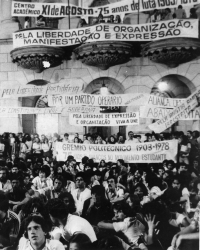by Emilee Gaebler
Impunity Watch Reporter, South America
BRASÍLIA, Brazil – Last week the Brazilian Congress took the first step forward in investigating the human rights abuses perpetrated during the military dictatorship which lasted from 1964 to 1985. On Wednesday they passed a bill to approve the creation of a commission to investigate these human rights abuses. The approved proposal now heads to the Senate and then to President Dilma Rousseff for approval.

The bill creates what is being called a truth commission. The duty of the commission will be to investigate and bring to light the human rights abuses that occurred during the period of several authoritarian leaders. The International Center for Transitional Justice (ICTJ) President, David Tolbert, stated that the Commission will help Brazilians to better understand a shadowed part of their history and aid in the recognition of rights for victims of abuse.
The commission would be comprised of 7 members who would be appointed by President Rousseff. The 7 members would investigate, for a period of 2 years, the torture, death, disappearances and hiding of bodies that occurred during the oppressive regimes. The military has offered their support of the commission. Their support is conditioned on the guarantee that investigations will look at both military abuses as well as abuses committed by opposition guerilla groups.
The positive aspects of the bill include the express recognition of the human rights violated at the time, investigations into disappearances of citizens to increase the possibility of discovering bodies and a comprehensive inquiry into the structures, institutions and places that lead to such systematic violation of human rights.
Critics note that there are a number of negative aspects to the bill. First, is the notable absence of an accountability mechanism. The commission will simply investigate and publish their findings at the end of the two year period. No punishment for any crimes they investigate will occur.
Linked to this concern, is the recent affirmation by the Brazilian Supreme Court that the commission will not overcome the country’s 1979 Amnesty Law. The law releases military personnel and civilians from liability for politically motivated crimes. It was originally formulated in order to give political prisoners and leaders, who were imprisoned and exiled, a way to return to the country. At the time it was largely unrecognized that it would also keep military crimes free from prosecution. In other South American nations, like Argentina, Chile and Peru, the establishment of truth commissions was the precursor to punishment of offenders and a full cycle of justice occurred.
Another concern is that the commission is too limited in scope; with only 7 members and only 2 years to investigate the crimes of 4 decades the reality is that only a cursory investigation will be possible. Roughly 500 Brazilians were killed in that period, another 150 disappeared and more than 20,000 citizens were tortured or abused.
For more information, please see;
Radio Netherlands Worldwide – Brazil: Truth or Reconciliation Without Prosecution? – 26 September 2011
International Center for Transitional Justice – Brazil: Six Critical Steps for Truth Commission Success – 22 September 2011
The New York Times – Brazil: Lower House Approves Truth Commission to Investigate Abuses During Military Dictatorship – 22 September 2011
MSNBC – Brazilian Lawmakers Approve Probe of Abuses – 22 September 2011
Times Live – Brazil Lower House Approves Truth Commission – 22 September 2011